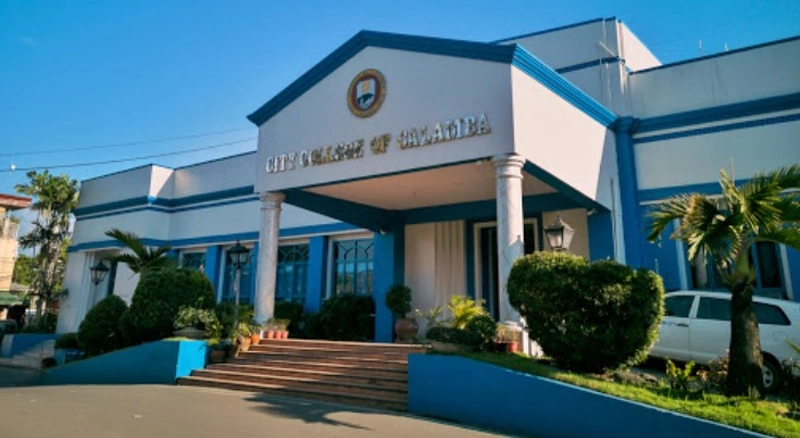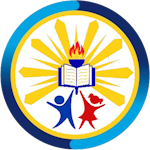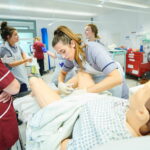City College of Calamba (CCC) is a public higher education institution in Laguna established in 2006 coinciding with the country’s national hero, Jose Rizal’s 145th birth anniversary. The institution was founded to provide low-cost and high-quality education to the underprivileged. It is also subsidized by the city government and offers free tuition.
The City College of Calamba is tasked to provide quality but affordable and relevant tertiary education to the underprivileged but deserving residents of the city and assist the City Mayor in carrying the education program.
City College of Calamba provides free and high quality education to the students of Calamba. It has opened a lot of opportunities and produced competent, conscientious, committed and compassionate global professionals. Some students are already losing hope in their chances to finish their education, but City College of Calamba was there to help financially challenged but deserving students. Additionally, the institution helps students become resilient and overcome any obstacles that may arise.
The City College of Calamba located in Barretto Street, Calamba City, Laguna, Philippines has been granted the benefits of free tuition and miscellaneous fees for its qualified college students by the Unified Student Financial Assistance System (UNIFAST) per the provision of Republic Act No. 10931, otherwise known as “Universal Access to Quality Tertiary Education Act“.
City College of Calamba
| Address: | Barretto Street, Calamba City, Laguna, Philippines |
| Contact No: | (049) 545-0160 |
| School Head: | Dr. Phoebe R. Sese – President |
| Year Established: | 2006 |
| Sector: | Public |
| Type: | Local Universities and Colleges (LUC’s) |
| Email: | [email protected] |
Academic Programs
Here is the list of available Courses Offered in City College of Calamba.
| COURSES OFFERED |
|---|
|
Department of Arts and Sciences
The Department of Arts and Sciences endeavors itself to be recognized as a globally competitive college, with outstanding faculty, committed creative and contemplative student scholars, who will serve as the center of academic excellence in the region in basic sciences, natural sciences, humanities, arts, researches and technologies.
- Bachelor of Arts in Psychology
At the end of this program, graduates will have the ability to:
- Demonstrate the capability to discuss and analyze the major theories and concepts in psychology.
- Demonstrate and apply the methods of psychological inquiry in building knowledge on local culture and context.
- Demonstrate and apply psychological theories and methods in personal and professional setting.
- Demonstrate capability for self-reflection and independent learning in a professional context.
- Demonstrate professional and ethical behaviors in research and practice in Psychology.
- Demonstrate harmonious interpersonal relationship with colleagues, clients and ot
Department of Teacher Education
The Department of Teacher Education shall be known as the center of excellence in teacher development and training in the region, thereby producing global education shapers who possess intellectual, moral, and ethical standards for the 21st century teacher and graduates.
- Bachelor of Elementary Education
At the end of this program, graduates will have the ability to:
- Demonstrate in-depth understanding of the diversity of learners in various learning areas.
- Manifest meaningful and comprehensive pedagogical content knowledge (PCK) of the different subject areas.
- Utilize appropriate assessment and evaluation tools to measure learning outcomes.
- Manifest skills in communication, higher order thinking and use of tools and technology to accelerate learning and teaching.
- Demonstrate positive attributes of a model teacher, both as an individual and as a professional.
- Manifest a desire to continuously pursue personal and professional development.
- Bachelor of Secondary Education Major in English
At the end of this program, graduates will have the ability to:
- Possess broad knowledge of language and literature for effective learning.
- use English as a global language in a multilingual context as it applies to the teaching of language and literature.
- Acquire extensive reading background in language, literature, and allied fields.
- Demonstrate proficiency in oral and written communication.
- Shows competence in employing innovative language and literature teaching approaches, methodologies, and strategies.
- use technology in facilitating language learning and teaching.
- Inspire students and colleagues to lead relevant and transfomative chances to improve learning and teaching language and literature.
- Display skills and abilities to be a reflective and research-oriented language and literature teacher.
- Bachelor of Secondary Education Major in Mathematics
At the end of this program, graduates will have the ability to:
- Exhibit competence in mathematical concepts and procedures.
- Exhibit proficiency in relating mathematics to other curricular areas.
- Manifest meaningful and comprehensive pedagogical content knowledge (PCK) of mathematics.
- Demonstrate competence in designing, constructing and utilizing different forms of assessment in mathematics.
- Demonstrate proficiency in problem-solving by solving and creating routing and non-routine problems with different levels of complexity.
- Use effectively appropriate approaches, methods, and techniques in teaching mathematics including technological.
- Appreciate mathematics as an opportunity for creative work, moments of enlightenment, discovery and gaining insights of the world.
- Bachelor of Secondary Education Major in Science
At the end of this program, graduates will have the ability to:
- Demonstrate deep understanding of scientific concepts and principles.
- Apply scientific inquiry in teaching and learning.
- Utilize effective science teaching and assessment methods.
Department of Business and Accountancy
The Department of Business and Accountancy envision itself to be the one of the leading schools on the field of business education in the region by providing globally competitive and God- fearing professionals and entrepreneurs who will share their resources in uplifting the lives of the needy but deserving students of City College of Calamba.
- Bachelor of Science in Accountancy
At the end of this program, graduates will have the ability to:
- Resolve business issues and problems, with a global and strategic perspective using knowledge and technical proficiency in the areas of financial accounting and reporting, cost accounting and management, accounting and control, taxation, and accounting information systems;
- Conduct accountancy research through independent studies of relevant literature and appropriate use of accounting theory and methodologies;
- Employ technology as a business tool in capturing financial and non-financial information, generating reports and making decisions;
- Apply knowledge and skills to successfully respond to various types of assessments; and (including professional licensure and certifications); and
- Confidently maintain a commitment to good corporate citizenship, social responsibility and ethical practice in performing functions as an accountant.
- Bachelor of Science in Accounting Information System
At the end of this program, graduates will have the ability to:
- Resolve business issues and problems, with a global and strategic perspective using knowledge and technical proficiency in the areas of financial accounting and reporting, cost accounting and management, accounting and control, taxation, and accounting information systems;
- Conduct accountancy research through independent studies of relevant literature and appropriate use of accounting theory and methodologies;
- Employ technology as a business tool in capturing financial and non-financial information, generating reports and making decisions;
- Apply knowledge and skills to successfully respond to various types of assessments; and (including professional licensure and certifications); and
- Confidently maintain a commitment to good corporate citizenship, social responsibility and ethical practice in performing functions as an accountant.
Department of Computing and Informatics
A leader provider of excellent information technology professional who manifest global standards, prepare to meet and respond to the needs and demands of the computer and IT industry.
- Bachelor of Science in Information Technology
At the end of this program, graduates will have the ability to:
- Knowledge for Solving Computing Problems:
IT01 – Apply knowledge of computing, science, and mathematics appropriate to the discipline.
IT02 – Understand best practices and standards and their applications. - Problem Analysis:
IT03 – Analyse complex problems, and identify and define the computing requirements appropriate to its solution.
IT04 – Identify and analyse user needs and take them into account in the selection, creation, evaluation and administration of computer-based systems. - Design/Development of Solutions:
IT05 – Design, implement, and evaluate computer-based systems, processes, components, or programs to meet desired needs and requirements under various constraints.
IT06 – Integrate IT-based solutions into the user environment effectively. - Modern Tool Usage:
IT07 – Apply knowledge through the use of current techniques, skills, tools and practices necessary for the IT profession. - Communication:
IT10 – Communicate effectively with the computing community and with society at large about complex computing activities through logical writing, presentations, and clear instructions. - Computing Professionalism and Ethics:
IT11 – Analyse the local and global impact of computing information technology on individuals, organizations, and society.
IT12 -Understand professional, ethical, legal, security and social issues and responsibilities in the utilization of information technology. - Life-Long Learning:
IT13 – Recognize the need for and engage in planning self-learning and improving performance as a foundation for continuing professional development.
- Bachelor of Science in Computer Science
At the end of this program, graduates will have the ability to:
- Knowledge for Solving Computing Problems:
CS01 – Apply knowledge of computing fundamentals, knowledge of a computing specialization, and mathematics, science, and domain knowledge appropriate for the computing specialization to the abstraction and conceptualization of computing models from defined problems and requirements. - Problem Analysis:
CS02 – Identify, analyze, formulate, research literature, and solve complex computing problems and requirements reaching substantiated conclusions using fundamental principles of mathematics, computing sciences, and relevant domain disciplines. - Design/Development of Solutions:
CS03 – An ability to apply mathematical foundations, algorithmic principles and computer science theory in the modelling and design of computer-based systems in a way that demonstrates comprehension of the trade-offs involved in design choices.
CS04 – Knowledge and understanding of information security issues in relation to the design, development and use of information systems.
CS05 – Design and evaluate solutions for complex computing problems, and design and evaluate systems, components, or processes that meet specified needs with appropriate consideration for public health and safety, cultural, societal, and environmental considerations. - Modern Tool Usage:
CS06 – Create, select, adapt and apply appropriate techniques, resources and modern computing tools to complex computing activities, with an understanding of the limitations to accomplish a common goal. - Individual & Team Work:
CS07 – Function effectively as an individual and as a member or leader in diverse teams and in multidisciplinary settings. - Communication:
CS08 – Communicate effectively with the computing community and with society at large about complex computing activities by being able to comprehend and write effective reports, design documentation, make effective presentations, and give and understand clear instructions. - Computing Professionalism and Ethics:
CS09 – An ability to recognize the legal, social, ethical and professional issues involved in the utilization of computer technology and be guided by the adoption of appropriate professional, ethical and legal practices. - Life-Long Learning:
CS10 – Recognize the need, and have the ability, to engage in independent learning for continual development as a computing professional.

Admission Procedure:
Qualification of Applicants:
Students must be permanent residents of Calamba. They must have graduated from any public or private school recognized by the Department of Education (DepEd) or from a higher education institution recognized by the Commission on Higher Education (CHED).
Schedule of Application:
Application for admission will start on April 28,2022-June 10, 2022.
Program Offerings
The City College of Calamba offers the following programs for this Fiscal Year 2022-2023:
- Bachelor of Science in Accountancy
- Bachelor of Science in Accounting Information System
- Bachelor of Elementary Education
- Bachelor of Secondary Education major in English
- Bachelor of Secondary Education major in Science
- Bachelor of Secondary Education major in Mathematics
- Bachelor of Science in Computer Science
- Bachelor of Science in Information Technology
- Bachelor of Science in Psychology*
- Bachelor of Early Childhood Education*
- *Subject to CHED approval. A separate update on this will be posted.
Requirements:
Complete the following requirements. Incomplete requirements shall not be accepted.
FRESHMEN Requirements
- Downloaded and duly accomplished CCC Student’s Application Form (GCTCDO-FO: 27) (Google form and printed computerized form)
- Photocopy of Report Card/Form 138, Grade 12, first semester grade , and 2nd semester (if available)
- Photocopy of Certificate of Good Moral Character
- Photocopy of PSA/NSO/Local Birth Certificate
- Photocopy of Barangay Certification indicating the number of years of residency (should be at least five years) of the applicant and parents/guardian.
- Photocopy Parents’/Guardian’s Voter’s Identification/Certification, or Student if available
3 pcs. 2×2 Picture (white background) - Photocopy of COVID vaccination card/certification (if available)
TRANSFEREES Requirements:
- Downloaded and duly accomplished CCC Student’s Application Form (GCTCDO-FO: 27) (Google form and printed computerized form)
- Certified True Copy of Transcript of Records
- Copy of Honorable Dismissal if available
- Photocopy of Certificate of Good Moral Character
- Photocopy of PSA/NSO/Local Birth Certificate
- Photocopy of Barangay Certification indicating the number of years of residency (should be at least five years) of the applicant and parents/guardian.
- Photocopy Parents’/Guardian’s Voter’s Identification/Certification, or Student if available
3 pcs. 2×2 Picture (white background) - One Photocopy of COVID vaccination card/certification (if available)
OLD CURRICULUM AND ALTERNATIVE LEARING SYSTEM GRADUATE (On or before 2017 Graduate) Requirements
- Downloaded and duly accomplished CCC Student’s Application Form (GCTCDO-FO: 27) (Google form and printed computerized form)
- Certified True Copy of Form 137 or Form 138 (For Old Curriculum)
- Certified True Copy of Certificate of Completion from DepEd (ALS Graduate only)
- Photocopy of Certificate of Good Moral Character
- Photocopy of PSA/NSO/Local Birth Certificate
- Photocopy of Barangay Certification indicating the number of years of residency (should be at least five years) of the applicant and parents/guardian.
- Photocopy Parents’/Guardian’s Voter’s Identification/Certification, or Student if available
3 pcs. 2×2 Picture (white background) - Photocopy of COVID vaccination card/certification (if available)
Transferring to CCC
City College of Calamba will accept transferees provided they have passed the following qualifications:
- The student does not have any grade of 5.00, Dropped, or Incomplete in any semester from his/her previous school/s.
- The student passed at least 36 academic units with a general weighted average of 2.25 or better for all collegiate academic units taken.
- The student will have to complete not less than 50% of the remaining units in the chosen program in the College.
- The Program Director has the prerogative on the admission of transferees with exceptional cases (i.e., Grades of 5.0, dropped, and INC) which will be dealt on a case-to-case basis.
Procedures
Kindly the following steps fro the submission of completed requirements.
- Applicants shall proceed to City College of Calamba’s Guidance, Counseling, Testing, and Career Development Office and submit the duly completed requirements.
- Applicants shall fill out the following forms: Application Number Sheet (GCTCDO – FO: 26), Checklist/Acknowledgment Slip, and Examination Permit (GCTCDO – FO: 24),
No examination fees will be collected. - The office shall only accommodate 50-80 applicants per day in a first come first serve basis.
Schedule of Examination
Schedule of Admission Examination will be held on JULY 21, 2022.
- A week before the examination date, school and room assignments will be posted on the CCC Guidance Office Official Facebook page.
- Suppose an applicant cannot attend the scheduled examination day due to an unforeseen occurrence. In that case, they must notify the Guidance Office and request rescheduling with a valid reason and supporting documents.
- The applicants shall bring the following on examination day; (a) Examination Permit, (b) Identification Card, (c) Pencil, and (d) Black and blue ballpen.
Announcement of Passers
The list of qualified applicants who passed the admissions screening will be presented on the City College of Calamba’s official communications channel. In addition, they shall be given a psychological test for further assessment and shall be scheduled for interview with the Guidance Counselor.
Pre-registration Process
Once the Admission Slip has been sent to their e-mail account during their applications, all qualified candidates are asked to pre-register at the URL supplied during the specified period. In addition, qualified candidates must complete the Guidance Transition Interview Form.
Enrollment and Medical Examination Procedures
Please take note of the following:
- The CCC Registrar’s Office will contact qualified candidates regarding enrolling procedures.
- Furthermore, qualifying individuals will be forwarded to CCC Health Services.
- Please contact the office regarding the filing of medical tests (drug testing, x-ray, and dental).
- Failure to follow the admission standards will result in their admission to the CCC revoked.
For inquiries regarding the school, enrollment requirements and other related matters, please contact (049) 545-0160 or visit the school at Barretto Street, Calamba City, Laguna.










